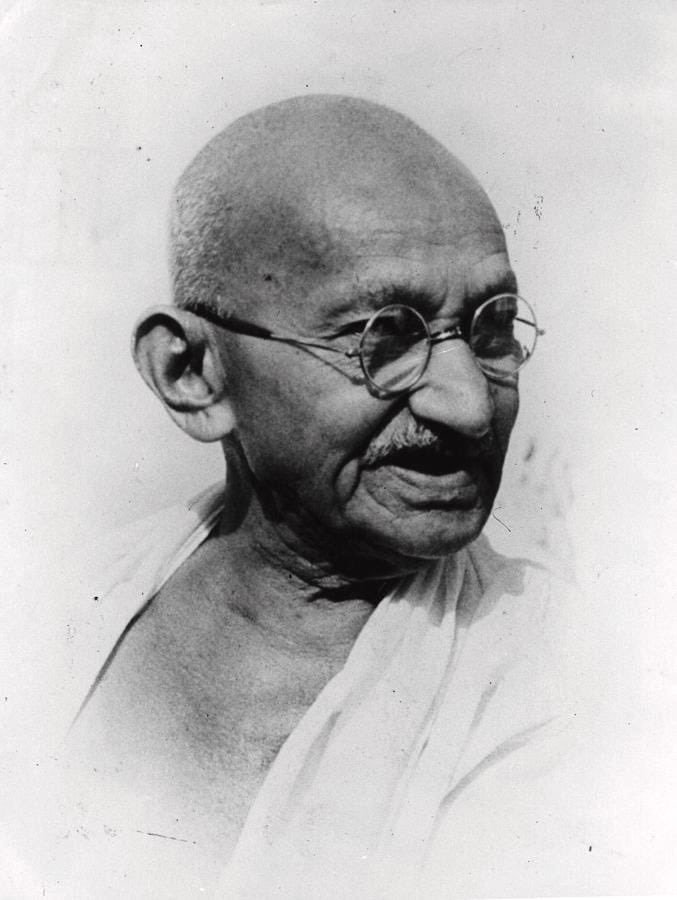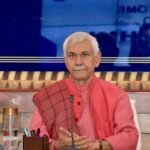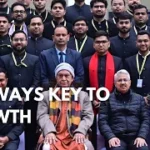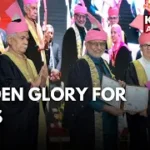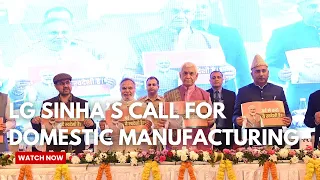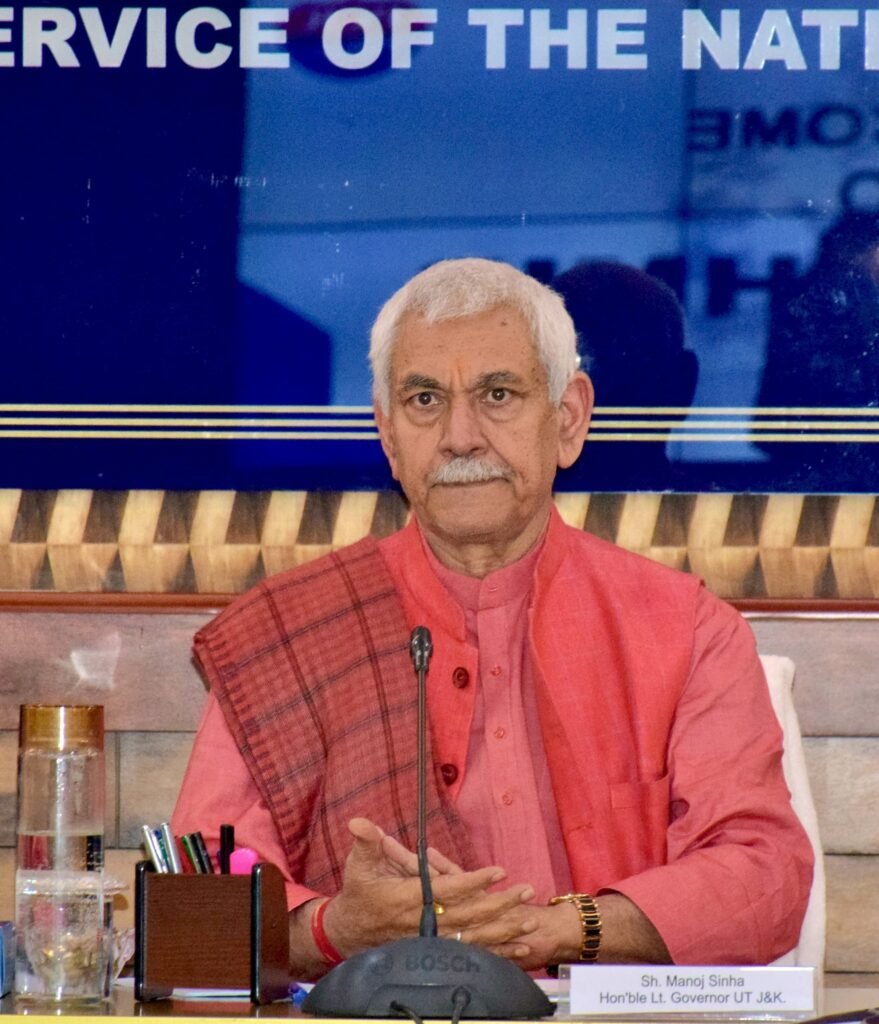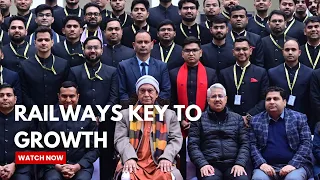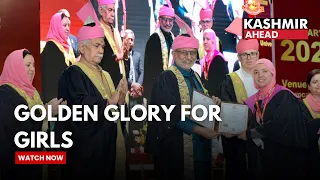Srinagar, October 2, 2025 – On the auspicious occasion of Gandhi Jayanti, marking the 156th birth anniversary of the Father of the Nation, Mahatma Gandhi, Lieutenant Governor Manoj Sinha extended heartfelt greetings to the people of Jammu and Kashmir. In a poignant message that resonates with the timeless ideals of Bapuji, Sinha called upon citizens to rededicate themselves to principles of peace, non-violence, truth, tolerance, compassion, and selfless service. Emphasizing the vision of a Viksit Bharat – a developed India – he urged collective efforts to build a harmonious society rooted in Gandhian philosophy.”Greetings to the people on the occasion of Gandhi Jayanti,” Sinha began in his official message, echoing the spirit of national unity and introspection. “On this momentous day, let us pledge and rededicate ourselves to follow Bapuji’s ideals of peace, non-violence, truth, tolerance, compassion, selfless service and contribute in building a Viksit Bharat.” These words, delivered on the eve of the celebrations, set the tone for a day filled with tributes, cultural programs, and community pledges across the Union Territory.The message from the Lieutenant Governor comes at a time when Jammu and Kashmir is witnessing transformative development under the national agenda of Viksit Bharat@2047. Sinha, who has been instrumental in steering the region towards progress since assuming office in 2020, highlighted how Gandhian values can serve as the bedrock for sustainable growth and social cohesion. His appeal aligns seamlessly with Prime Minister Narendra Modi’s vision of a self-reliant and developed nation, where ethical governance and community welfare take precedence.
The Enduring Legacy of Mahatma Gandhi: A Beacon for Modern India
Mahatma Gandhi, born Mohandas Karamchand Gandhi on October 2, 1869, in Porbandar, Gujarat, remains an iconic figure whose life and philosophy continue to inspire billions worldwide. Revered as the apostle of non-violence (Ahimsa) and truth (Satya), Gandhi led India’s struggle for independence through peaceful means, culminating in freedom from British colonial rule in 1947. His methods, including the Salt March, Quit India Movement, and emphasis on Swadeshi (self-reliance), demonstrated the power of moral force over brute strength.Gandhi’s ideals extend far beyond the realm of politics. He championed tolerance in a diverse society plagued by communal tensions, advocating for Hindu-Muslim unity and the upliftment of the marginalized. His fight against untouchability, promotion of women’s empowerment, and vision of Gram Swaraj (village self-governance) laid the foundation for a just and equitable India. As Gandhi himself eloquently stated, “An eye for an eye will only make the whole world blind,” a quote that underscores the futility of violence and the supremacy of compassion.In the context of Viksit Bharat, Gandhi’s principles find renewed relevance. The national initiative, launched by the Government of India, aims to propel the country to a $30 trillion economy by 2047, with pillars encompassing economic growth, social justice, environmental sustainability, and good governance. Sinha’s invocation of these ideals ties Gandhi’s legacy directly to contemporary goals, reminding citizens that development must be holistic – not just material, but moral and ethical.
Manoj Sinha: A Leader Committed to Gandhian Values in Action
Lieutenant Governor Manoj Sinha, a seasoned administrator and former Union Minister, has consistently embodied Gandhian ethos in his governance style. Born in 1959 in Ghazipur, Uttar Pradesh, Sinha’s political journey began with the Bharatiya Janata Party (BJP), where he served as a Member of Parliament from Purvanchal for three terms. His tenure as Minister of State for Railways and Civil Aviation (2019-2020) was marked by initiatives promoting infrastructure and connectivity, aligning with Gandhi’s dream of an accessible India.Since taking charge as Lieutenant Governor of Jammu and Kashmir in August 2020, Sinha has focused on peace and reconciliation in a region long scarred by conflict. Under his leadership, the Union Territory has seen unprecedented investments in tourism, horticulture, and youth empowerment. Projects like the promotion of organic farming in Kashmir’s apple orchards reflect selfless service to local economies, while interfaith dialogues foster tolerance and communal harmony.Sinha’s message on Gandhi Jayanti is not an isolated statement but part of a broader narrative. In previous years, he has echoed similar sentiments. For instance, on the 155th birth anniversary in 2024, Sinha remarked, “Gandhi Jayanti is an occasion for all of us to rededicate ourselves to the ideals and values of Pujya Bapu on peace, truth, sacrifice and non-violence.” He quoted Gandhi: “Non-violence is a power which can be wielded equally by all – children, young men and women or grown-up people, provided they have a living faith in the God of Love and have therefore equal love for all mankind.” This year, his pledge for Viksit Bharat adds a forward-looking dimension, urging the youth to channel Gandhian energy into innovation and nation-building.In an exclusive interaction with local media on the eve of the celebrations, Sinha elaborated, “Mahatma Gandhi taught us that true development begins with self-purification. In Jammu and Kashmir, we are witnessing how compassion and tolerance can heal divides. Let us pledge to make Viksit Bharat a reality by embracing selfless service in every sphere of life.” His words resonated deeply, especially amid ongoing efforts to integrate the region into national development frameworks.
Gandhi Jayanti Celebrations Across Jammu and Kashmir: A Tapestry of Unity
The day dawned with solemn tributes at Gandhi memorials across the Union Territory. In Srinagar, the historic Lal Chowk witnessed a massive Swachh Bharat Abhiyan drive, where volunteers, inspired by Gandhi’s emphasis on cleanliness as a form of selfless service, cleaned public spaces and planted saplings. School children performed skits on Gandhi’s Dandi March, reciting his famous quote: “Be the change that you wish to see in the world.”In Jammu, the celebrations at the Gandhi Bhawan included a pledge-taking ceremony attended by over 5,000 people. Lieutenant Governor Sinha virtually addressed the gathering, reiterating his message: “On this momentous day, let us pledge and rededicate ourselves to follow Bapuji’s ideals of peace, non-violence, truth, tolerance, compassion, selfless service and contribute in building a Viksit Bharat.” The event featured Kathakali performances depicting scenes from Gandhi’s life, blending art with advocacy for non-violence.Meanwhile, in remote areas like Kupwara and Rajouri, community leaders organized workshops on conflict resolution, drawing from Gandhi’s philosophy of Satyagraha (truth-force). “Gandhi Ji’s teachings of truth and compassion are vital for our youth, who are the architects of Viksit Bharat,” said local activist Rehana Begum during a panel discussion. These grassroots initiatives underscore how Sinha’s call is translating into action, fostering tolerance in diverse communities.Chief Minister Omar Abdullah complemented Sinha’s message, stating, “Gandhi Ji’s timeless teachings of truth(Satya), non-violence (Ahimsa), peace and humanity hold greater significance in today’s world, which continues to grapple with conflict, divisions and social discord.” He added, “He waged an unwavering struggle against social evils such as untouchability, the caste system and inequality, and stood for justice, compassion and equality of all.” Abdullah’s emphasis on tolerance, harmony, and brotherhood mirrors Sinha’s vision, signaling bipartisan commitment to Gandhian ideals.
Integrating Gandhian Ideals into Viksit Bharat: Pathways Forward
The concept of Viksit Bharat envisions an India that is economically prosperous, socially inclusive, and environmentally sustainable. Sinha’s message positions Gandhi’s principles as the ethical compass for this journey. For instance, non-violence translates to sustainable development practices, such as renewable energy projects in Ladakh that minimize ecological harm. Truth and tolerance are evident in transparent governance initiatives, like the digital land records system reducing corruption in Jammu and Kashmir.In the economic sphere, Gandhi’s advocacy for Khadi and village industries aligns with Atmanirbhar Bharat (Self-Reliant India). Sinha has promoted handicrafts and handlooms in Kashmir, creating livelihoods for artisans while preserving cultural heritage. ” Selfless service is the soul of Viksit Bharat,” Sinha noted in a follow-up statement. “By empowering local communities, we honor Bapuji’s dream of Gram Swaraj.”Education plays a pivotal role too. Under Sinha’s stewardship, schools in the region have integrated Gandhian studies into curricula, teaching students about compassion through community service programs. A recent survey by the Jammu and Kashmir Education Department revealed that 70% of students now participate in annual peace marches, inspired by Gandhi’s walks for unity.Challenges remain, however. In a polarized world, upholding non-violence amid global conflicts tests resolve. Sinha addressed this, quoting Gandhi: “The weak can never forgive. Forgiveness is the attribute of the strong.” He called for dialogue over division, particularly in border areas where tolerance can bridge ethnic gaps.Experts laud Sinha’s approach. Dr. Farah Khan, a Gandhian scholar at the University of Kashmir, opined, “Lieutenant Governor Sinha’s message is a masterstroke in linking historical ideals with futuristic goals. By invoking Viksit Bharat, he makes Gandhi relevant to millennials dreaming of tech-driven progress.” Similarly, environmentalist Ravi Mehta highlighted how Gandhi’s simplicity counters consumerism, aiding sustainable goals in Viksit Bharat.Youth and Women: Pillars of a Gandhian RenaissanceSinha’s pledge particularly targets the youth, who form 65% of Jammu and Kashmir’s population. “Young minds must embrace truth and compassion to innovate responsibly,” he said. Initiatives like the Yuva Fellowship, launched under his administration, train youngsters in social entrepreneurship, embodying selfless service. Participants develop apps for disaster relief, promoting peace in vulnerable regions.Women, whom Gandhi called “the other half of the nation,” are central to this narrative. Sinha’s government has boosted self-help groups under the Mission Shakti program, empowering over 50,000 women with skills in weaving and beekeeping. ” Tolerance and compassion start at home,” Gandhi once said. Echoing this, Sinha remarked, “Let us build a Viksit Bharat where every woman leads with Bapuji’s grace.
“Global Echoes: Gandhi’s Influence Beyond Borders
Gandhi’s ideals transcend India, influencing leaders like Martin Luther King Jr. and Nelson Mandela. On this Gandhi Jayanti, world leaders reiterated their admiration. UN Secretary-General Antonio Guterres tweeted, “Gandhi’s non-violence remains a powerful tool against hatred.” In Jammu and Kashmir, this global resonance inspires cross-cultural exchanges, with Sinha advocating for peace diplomacy in South Asia.A Pledge for Tomorrow: Rededicating to Bapuji’s VisionAs the sun sets on Gandhi Jayanti 2025, Manoj Sinha’s message lingers as a clarion call. “On this momentous day, let us pledge… to contribute in building a Viksit Bharat,” he concluded. Across prayer meetings, cleanliness drives, and cultural fests, citizens took the oath, vowing peace, non-violence, truth, tolerance, compassion, and selfless service.In the words of Gandhi: “You must be the change you wish to see in the world.” Under leaders like Sinha, Jammu and Kashmir – and indeed India – marches towards that change, weaving Bapuji’s ideals into the fabric of Viksit Bharat. The journey is long, but the path is illuminated by eternal light.

